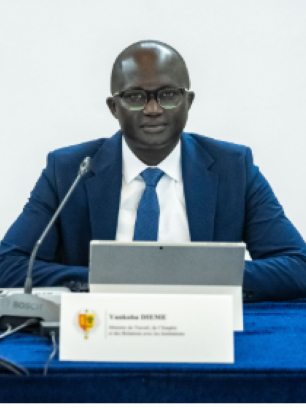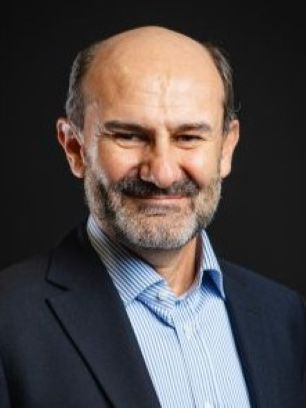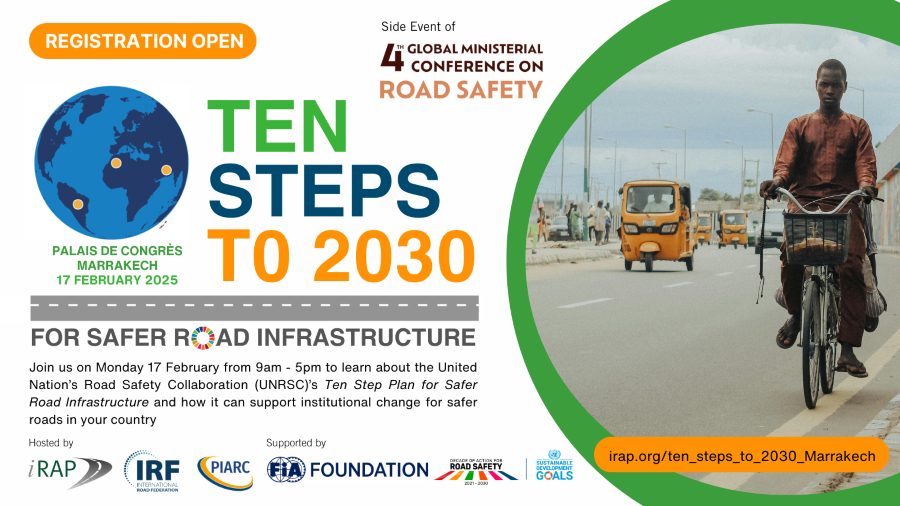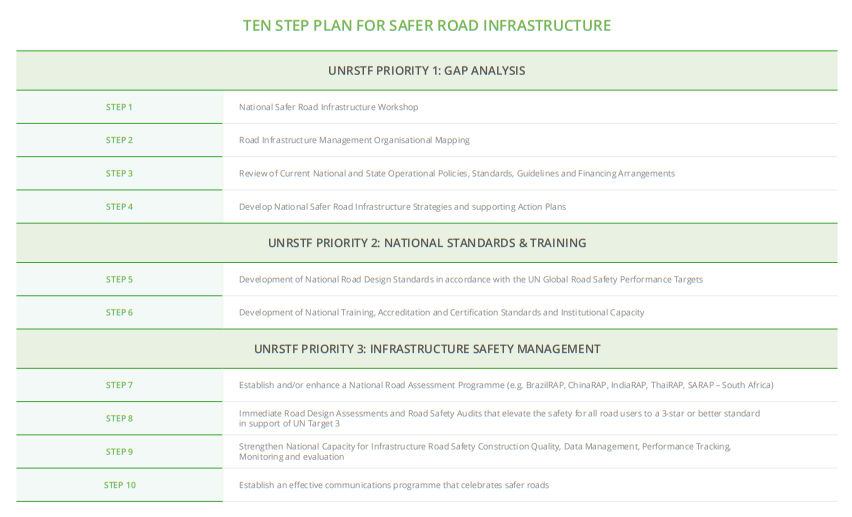Aligned to the 4th Global Ministerial Conference on Road Safety, the Ten Steps to 2030 for Safer Road Infrastructure Event will be held on Monday 17 February from 9am – 5pm at the Palais de Congres in Marrakech, hosted by the International Road Assessment Programme (iRAP), International Road Federation (IRF) and PIARC (World Road Association).
It will bring together 150-200 leaders and road safety experts from around the world to accelerate action towards the Sustainable Development Goals’ (SDG) target of halving road deaths and injuries by 2030, with a particular focus on how to eliminate high-risk roads and streets for pedestrians, cyclists, motorcyclists and vehicle occupants.
The impressive road safety impact of the Ten Step Plan for Safer Road Infrastructure will be shared, including its implementation success in countries, and its life-saving potential as a template that can be adopted by any country to achieve safer roads and mobility for a sustainable future for all.
Speakers

Abdallah Hamis Ulega
Minister of Roads, Tanzania
(invited)

Yankhoba Diémé, Minister of Infrastructures, Land and Air Transports, Senegal (invited)

Eng. Badr Abdullah Al-Dulami
Vice Minister, Transport and Logistic Services, Saudi Arabia (invited)

Nneka Henry
Head
UN Road Safety Fund

Juan Carlos Munoz Abogabir
Minister of Transport and Telecommunications, Chile

Jacob Hara MP
Minister of Transport and Public Works, Malawi (invited)

Susanna Zammataro
Director General
IRF

Saul Billingsley
Executive Director
FIA Foundation

Esteban Diez Roux
Operation Senior Advisor
IDB

Weimin Ren
Chair, UNRSF Steering Committee
and Director, Transport Division
UNESCAP

Dimitrios Mandalozis
President, IRF and
Chief Operations Officer
Aegean Motorway SA

Cathy Miller
Head of Road Safety
UK Department for Transport (DfT)

Bosco Marti
Executive Director of Institutional and Communication Affairs, Aleatica

Susan Hipp
Executive Director, Network of Employers for Traffic Safety (NETS)

Jamie Leather
Chief of Transport Sector Group, ADB

Greg Smith
Acting CEO and Global Program Director, iRAP

Peter Jamieson
Managing Director, Anditi

Lateef Ramoni
Assistant Corps Commander, FRSC Nigeria and Focal Person, West African Road Safety Organisation (WARSO)

Natalie Chiavassa
Safer Journeys Lead for Africa, iRAP

Dipan Bose
Senior Transport Specialist, World Bank

Samar Abouraad
Safer Journeys Specialist, iRAP

Aubin Essaie Moussa
President, African Road Maintenance Fund Association (ARMFA)

Stephen Perkins
Head of Research and Policy Analysis, ITF

Nathalie Angibeau
North Africa Director
UNOPS

Sangjin Han
Professor, Seoul National University

Sameera Munshi
Operations Manager, Anglo American Foundation

Julio Urzua
Global Projects Director, iRAP

Patrick Mallejacq
Secretary General, PIARC

James Bradford
Global Technical Director, iRAP

Judy Williams
Global Program and Communications Manager, iRAP

Steve Phillips
Secretary General, Conference of European Directors of Roads
The event will be delivered in-person only. Registration is free, however be quick! Numbers are limited.
It is the responsibility of all participants to also pre-register for the 4th Global Ministerial Conference on Road Safety, of which our event is a Side Event. To do this, click here. The Ministerial organisers will notify you directly of acceptance.
About the Ten Step Plan for Safer Road Infrastructure
The Ten Step Plan for Safer Road Infrastructure was produced by the United Nations Road Safety Collaboration (UNRSC) partners to support countries seeking to improve road infrastructure safety including implementing the UN Convention on Road Traffic and Road Signs and Signals, and achieving Global Road Safety Performance Targets 3 and 4. The Plan provides a framework to build the institutional capacity, partnerships and regulatory framework in countries.
Tanzania was the first country in the world to implement the Ten Step Plan. Jointly funded by the United Nations Road Safety Fund (UNRSF), UKAid and Global Road Safety Facility (GRSF), and under the guidance of the United Nations Economic Commission for Africa (UNECA), the project was implemented by a consortium of the International Road Federation (IRF), iRAP, the World Road Association (PIARC) and the Tanzania Roads Association (TARA), together with the Government of Tanzania and local agencies. The project led to the launch of a locally led TanRAP Road Assessment Programme; a Training and Accreditation Scheme to build local capacity; recommendations for a National Road Safety Strategy and revisions to the Road Geometric Design Manual; and expansion of more than 10,000 km of safety assessments using the global iRAP methodology influencing more than USD$1 billion of development bank investment. The project was awarded a 2023 Prince Michael International Road Safety Award.
A Ten Step Senegal Project will be officially launched in Dakar in January 2025. Funded by the United Nations Road Safety Fund (UNRSF), the project is a collaborative initiative involving the Government of Senegal through the Ministry of Infrastructure, Land, and Air Transport (MITTA) and National Road Agency ANASER, alongside a consortium led by iRAP and including the IRF, PIARC and LASER International, with support from the Private Infrastructure Development Group (PIDG) and FIA Foundation. The project aims to build local capacity and help to catalyse investment in safer roads.
With the support of a grant from the UNRSF, iRAP, IRF and EASST are supporting Tajikistan, Uzbekistan, and Kyrgyzstan on a key step of the Ten Step Plan, to update road design standards, as part of the Safe and Inclusive Road Design – Central Asia project.
Also with the support of a grant from the UNRSF, Senegal and international partners will soon begin implementing a Ten Step Senegal Project, with an aim of building capacity and helping to catalyse investment in safer roads.
The Ten Step Plan offers a template that can be adopted by any country and implemented in a way that matches the specific local context and needs, to empower safer mobility for all road users. See the Plan Framework below:
4th Global Ministerial Conference on Road Safety and associated Side Events
The 4th Global Ministerial Conference on Road Safety will be held in Marrakech from 18-20 February 2025, with Side Events (including the Ten Steps to 2030 Event) from 15-20 February.
The Ministerial will bring together global leaders, policymakers, and road safety advocates from 193 countries to assess progress made in implementing the Global Plan for Road Safety 2021-2030 during its initial five-year period, and catalyse transformative actions to achieve the SDG target of halving global road deaths by 2030.
See the program here.
We’re working with United Nations Road Safety Collaboration (UNRSC) partners and national stakeholders to mobilise national engagement, and National Commitments for Safer Roads. We need your help!



















